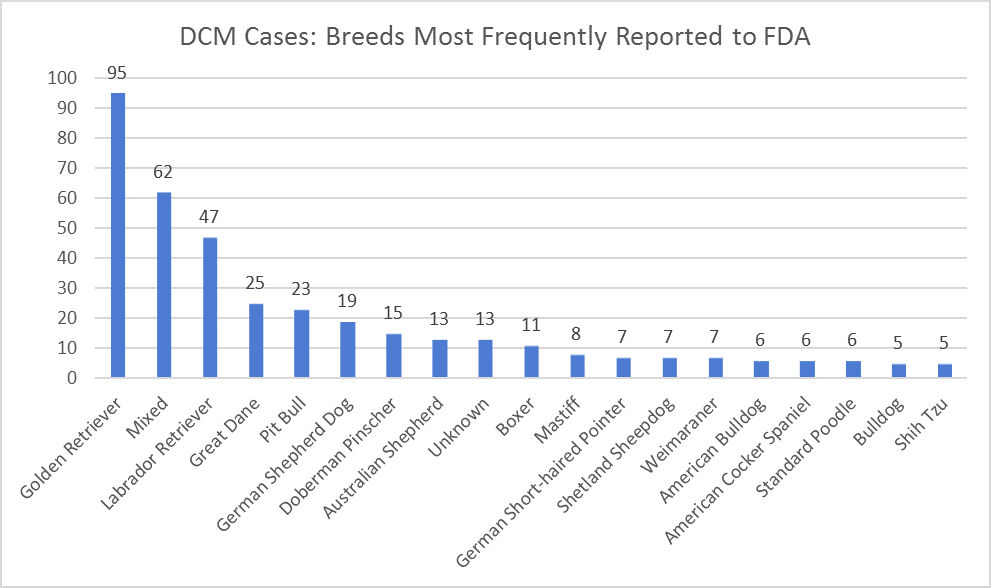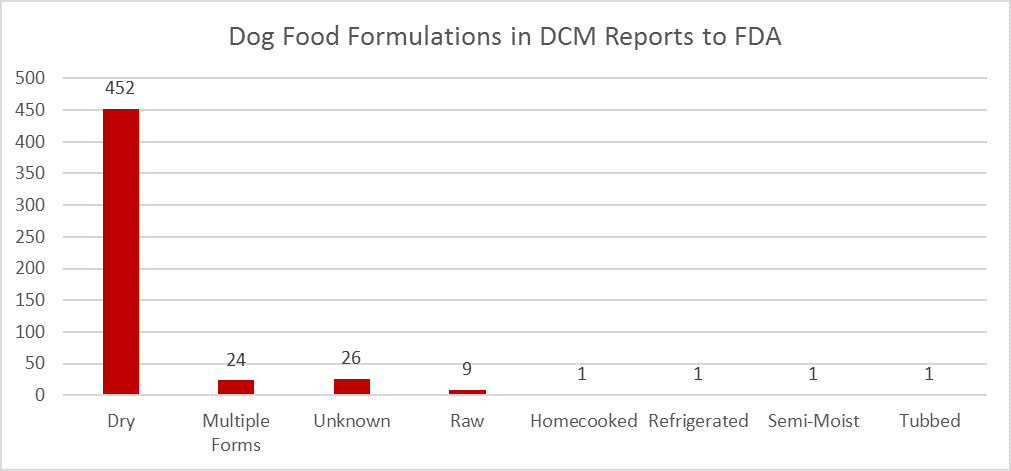This came in yesterday.
The Food and Drug Administration has named 16 dog food brands with an increased risk of a type of canine heart disease known as dilated cardiomyopathy… or DCM.
To learn which dog food brands are affected and 8 things you can do right now to lower your dog’s risk, please visit the following link:FDA Investigating Possible Link Between Diet and Heart Disease in DogsImportant Best Dry Dog Foods Update
We’ve recently updated our Best Dry Dog Foods page to reflect the FDA’s latest report. Here are 5 of The Advisor’s Top 20 Best Dry Dog Foods for July 2019.
- Wellness Complete Health Dog Food
- Victor Hi-Pro Plus Formula
- Nulo Freestyle Dog Food
- Eagle Pack Natural Dog Food
- Canidae Grain-Free Pure
Please be sure to share the news of this alert with other pet owners.
Mike Sagman, Editor
The Dog Food Advisor
Now if one goes to that first link then you will read the following.
ooOOoo
FDA Investigating Potential Link Between Diet and Heart Disease in Dogs

This Report Has Been Updated
June 27, 2019 — The FDA has published its third status report regarding a potential connection between grain-free diets and a type of heart disease in dogs known as dilated cardiomyopathy… or DCM.
The Dog Food Advisor initially alerted readers about this issue on July 12, 2018, the day it was first announced by the FDA… and continues to update this report on an ongoing basis.
About DCM
DCM is a disease of a dog’s heart muscle that results in weakened contractions and poor pumping ability…
Which can lead to an enlarged heart and congestive heart failure.
Even death.
Which Breeds Are Affected?
Although the root cause of DCM remains unknown…
And even though initially the condition appeared to be more common in certain breeds…
The FDA has received reports of DCM in a wide range of breeds, including many not genetically prone to the disease.

Likely Linked to Diet
Since announcing its investigation in July 2018…
FDA researchers have observed that most of these DCM cases were associated with animals eating dry dog foods.
However…
Dogs eating raw, semi-moist, and wet diets were also affected.

What Types of Dog Food?
Researchers found that over 90 percent of the reported recipes were grain-free.
And that…
Most of these animals ate diets that appeared to contain high concentrations of peas, chickpeas, lentils… or various types of potatoes.
Yet some dogs consumed diets that contained grain, too.

Which Brands?
Brands named most frequently in these reports are depicted in the following FDA graphic…

The FDA reminds readers…
“It’s important to note that the reports include dogs that have eaten grain-free and grain containing foods and also include vegetarian or vegan formulations. They also include all forms of diets: kibble, canned, raw and home-cooked.
“Therefore, we do not think these cases can be explained simply by whether or not they contain grains, or by brand or manufacturer.
The Agency goes on to assure dog owners…
“To put this issue into proper context, the American Veterinary Medical Association estimates that there are 77 million pet dogs in the United States.
“As of April 30, 2019, the FDA has received reports about 560 dogs diagnosed with DCM suspected to be linked to diet. Tens of millions of dogs have been eating dog food without developing DCM.”
The FDA also makes the following logical observation…
The prevalence of reports in dogs eating a grain-free diet might correlate also to market share: these products have become exceedingly popular over the last several years.
Which would certainly explain the higher number of DCM cases associated with these same brands.
What’s the Cause?
Based on its latest update…
The FDA has still not discovered why certain dog foods may be associated with the development of DCM. In fact, the Agency now believes the connection between diet and DCM is a complex scientific issue involving multiple factors.
Still…
Even though it’s not clear exactly what it is about these diets that may be connected to DCM in dogs, there are a number of possible causes.
For example…
Taurine deficiency is a well-documented, potential cause of some cases of DCM. Yet it’s not likely to be the only cause.
In fact…
According to Dr. Lisa Freeman, a veterinary nutritionist at Tufts University, “most dogs being diagnosed with DCM do not have low taurine levels”.
Which means…
It’s not reasonable to assume a taurine deficiency is the definitive cause of DCM.
The One Common Thread
According to the FDA, researchers have uncovered one dietary feature common to a large number of DCM cases…
“The common thread appears to be legumes, pulses (seeds of legumes), and/or potatoes as main ingredients in the food. This also includes protein, starch and fiber derivatives of these ingredients…
“Some reports… indicate that the pets were not eating any other foods for several months to years prior to exhibiting signs of DCM.
Editor’s comment: As previously noted, most of these animals appeared to eat diets that contain high concentrations of plant-based protein “boosters”. These include items like pea protein, dried peas, and potato protein. Or a number of legumes (ingredient splitting) located near the top of the ingredients list.
8 Things You Can Do Right Now to Lower Your Dog’s Risk
Until the FDA completes its study and releases its final report…
The Dog Food Advisor believes it makes good sense to apply science and logic to all your feeding decisions.
So, consider these commonsense tips…
- Since vegetable protein tends to be incomplete (deficient in certain essential amino acids needed by a dog to sustain life), avoid brands that derive most of their protein from legumes and other plant-based protein boosters
- Don’t avoid any brand just because it contains peas, legumes or potatoes. In reasonable amounts, studies have not found these ingredients to be toxic
- Avoid brands that list pea protein, potato protein, or other plant-based protein concentrates among their first few ingredients
- Avoid brands that use the deceptive practice of ingredient splitting to hide the fact their recipes are dominated by non-meat components… like corn, rice or legumes
- Consider switching your dog to a quality grain-inclusive product
- Focus on the recipe. Not the brand. To satisfy consumer demand, companies sometimes replace the meat in certain products with cheaper plant-based alternatives. Yet they still offer other recipes with superior, meat-rich designs
- Don’t put all your eggs in one basket. Diversify. Since no dog food can ever be perfect, consider using diet rotation to lower the risk of endlessly feeding your pet the same imperfect product
- Need help? Consider switching your dog’s current diet to one of the many found on our best dog foods lists
What We’re Doing to Help
Since the FDA’s latest status report was published on June 27, 2019, The Dog Food Advisor research team has been working on 3 important projects…
- We’re updating all our Best Dog Foods lists to reflect the FDA’s latest findings. This process is tedious and time-consuming. So, please allow up to 3 weeks
- We’re revisiting all our grain-free dog food reviews and making changes (when appropriate). You can expect most recipes to retain their current ratings while others will be lowered by up to 1-star
- We’re creating a list of “Best Dog Foods with Grain” to help pet parents find a sensible alternative to grain-free diets
There are hundreds of painstakingly prepared reviews and lists that need to be manually edited. You should expect this total project to take months to complete.
The Bottom Line
Final results are still not available.
And there’s no way to know how long the FDA’s investigation will take. Yet the Agency is hopeful that as more data becomes known, its scientists will gain a better understanding of the possible connection between diet and DCM.
Until we know the answer…
Be patient.
Don’t overreact.
And don’t be frightened by all the well-meaning yet misguided advice you’ll surely encounter on the Internet.
Even from uninformed professionals.
Base your feeding decisions on facts and science.
Including accurate label analysis.
Keep in mind…
The Dog Food Advisor has never favored any recipe just because it’s grain free.
Nor should you.
Instead…
Our ratings are heavily weighted in favor of our estimate of each recipe’s apparent meat content.
In fact…
Ratings are automatically reduced anytime we find excessive amounts plant-based protein “boosters” (like peas, legumes or non-meat protein concentrates) too close to the top of any ingredients list.
Finally…
Many of the very best dog foods on the market are grain free…
And they’re made by some of the most respected companies in the USA and Canada.
We’re confident the industry will quickly adapt its recipes to any decisive conclusions reached by the FDA’s future findings.
And of course, we’ll make any relevant adjustments to our content as needed to reflect these scientific findings (once they become available).
In the meantime…
Our Very Best Advice
Since there’s no such thing as a perfect dog food…
And because built-in flaws tend to be magnified when the same food is fed endlessly… day after day for a lifetime.
You may wish to consider diet rotation when feeding your pet.
Most importantly…
Stay informed.
Keep in mind…
We can update you the moment the FDA releases its findings.
Get free dog food recall alerts sent to you by email. Subscribe to The Dog Food Advisor’s emergency recall notification system.
Protect Your Dog
Sent to You by Email
Click Here to Sign Up Now
Thank you, Paul. Definitely bookmarked it.
LikeLike
Good! It’s not as clear as we been used to but that’s not the point. The main lesson is to vary your dog’s diet.
LikeLiked by 1 person
Just like our diets should be varied.
LikeLike
Quite so!
LikeLiked by 1 person
Thanks, Paul. Have shared this on social media.
LikeLike
That’s grand! Many thanks.
LikeLiked by 1 person
Thank YOU!
LikeLike